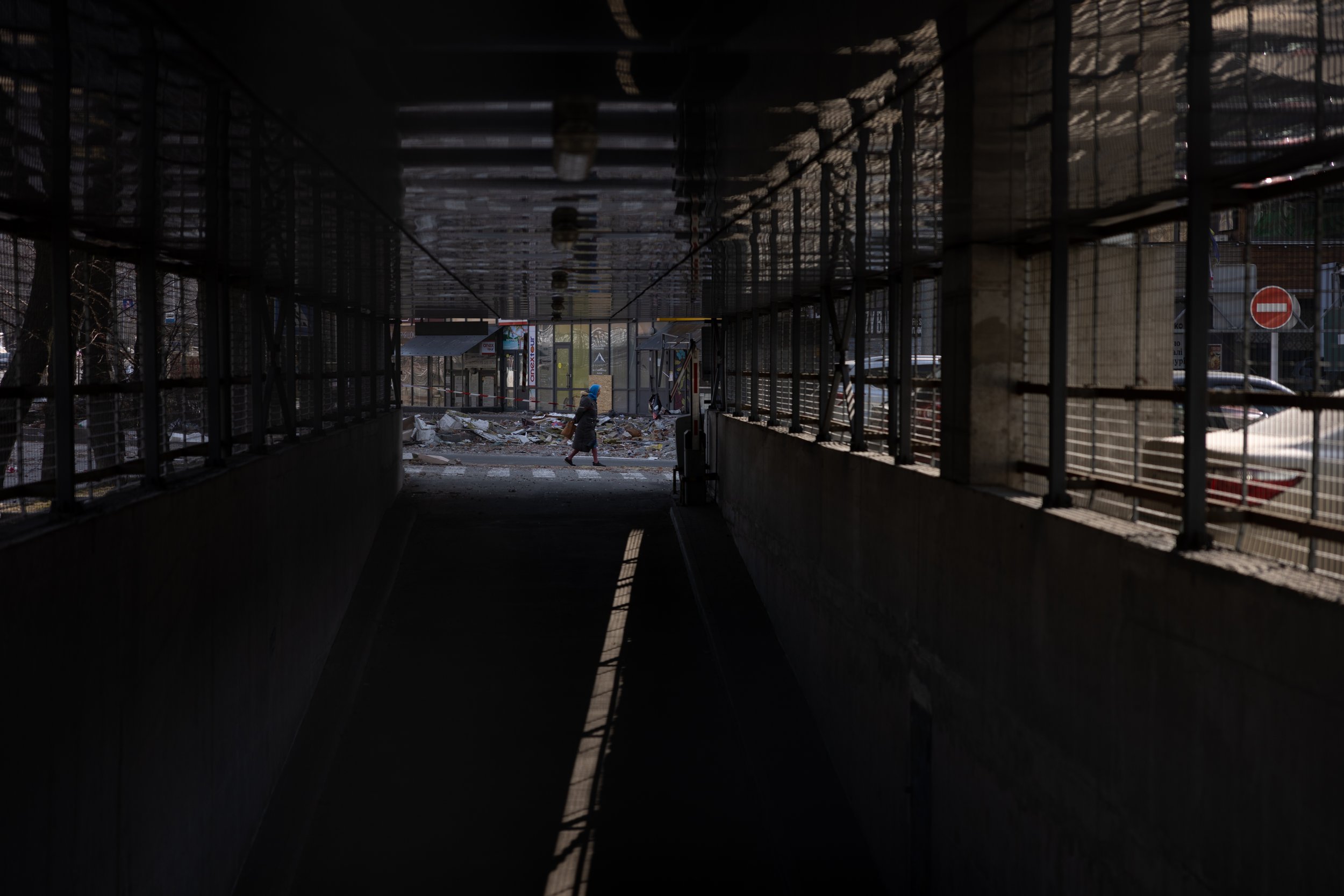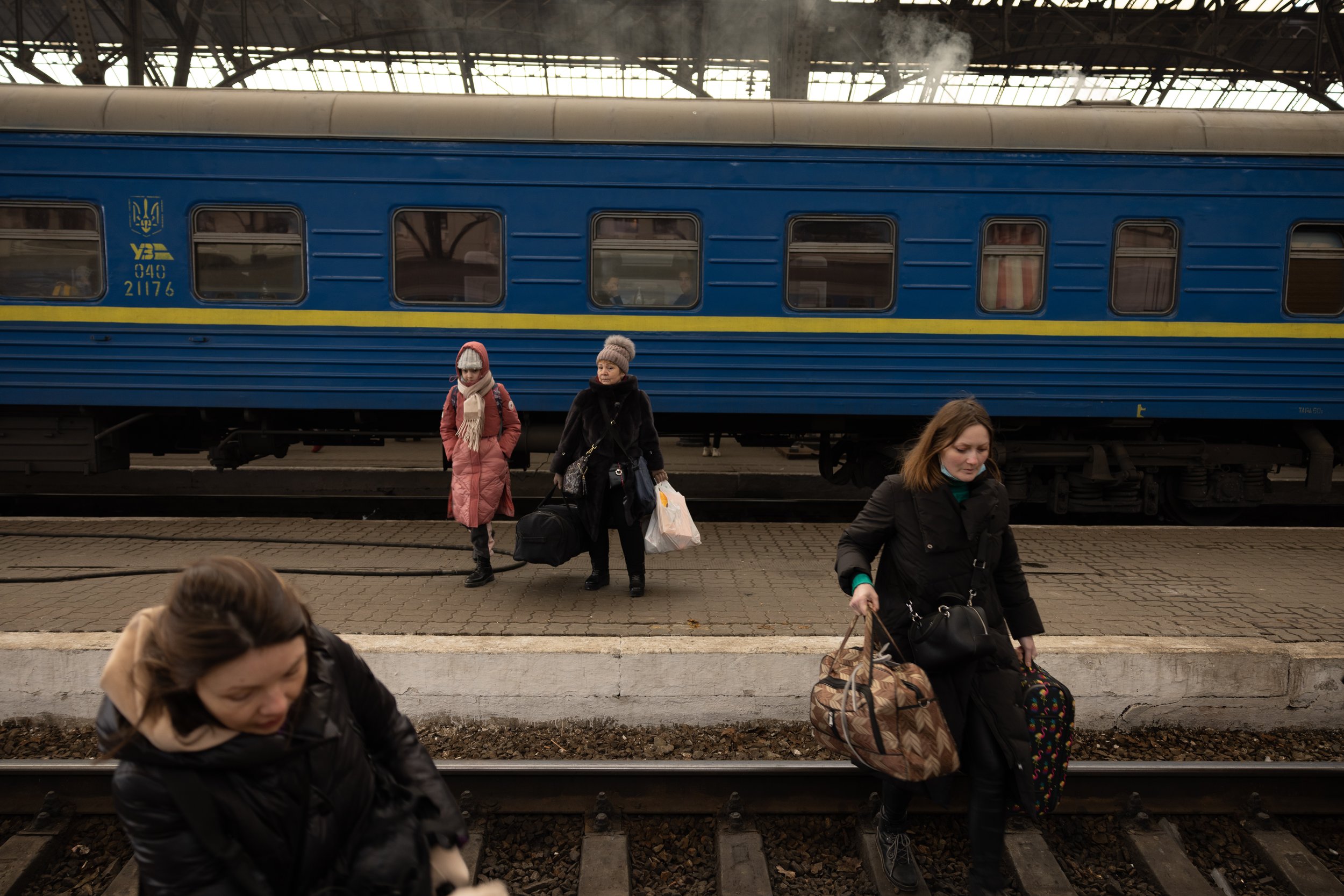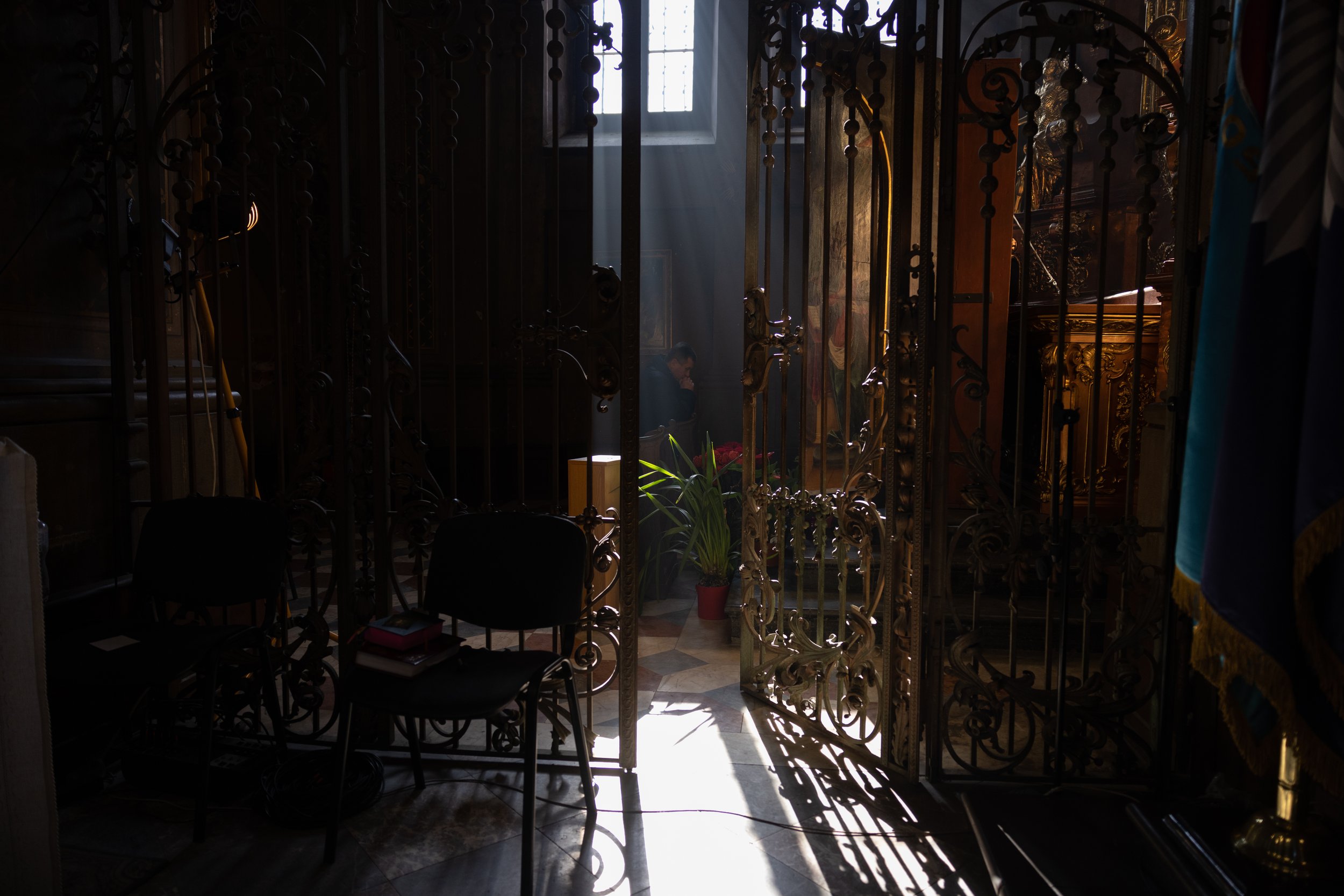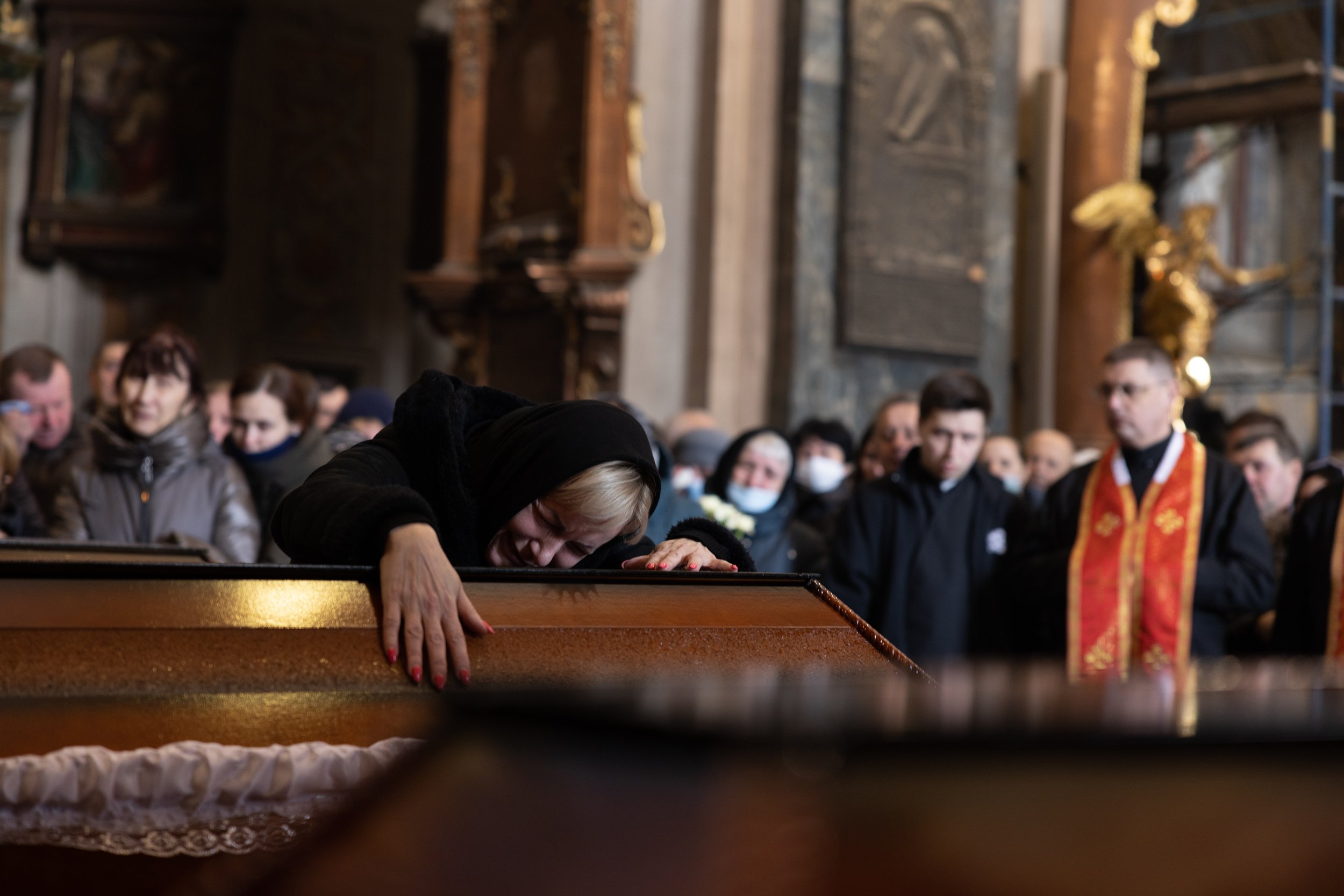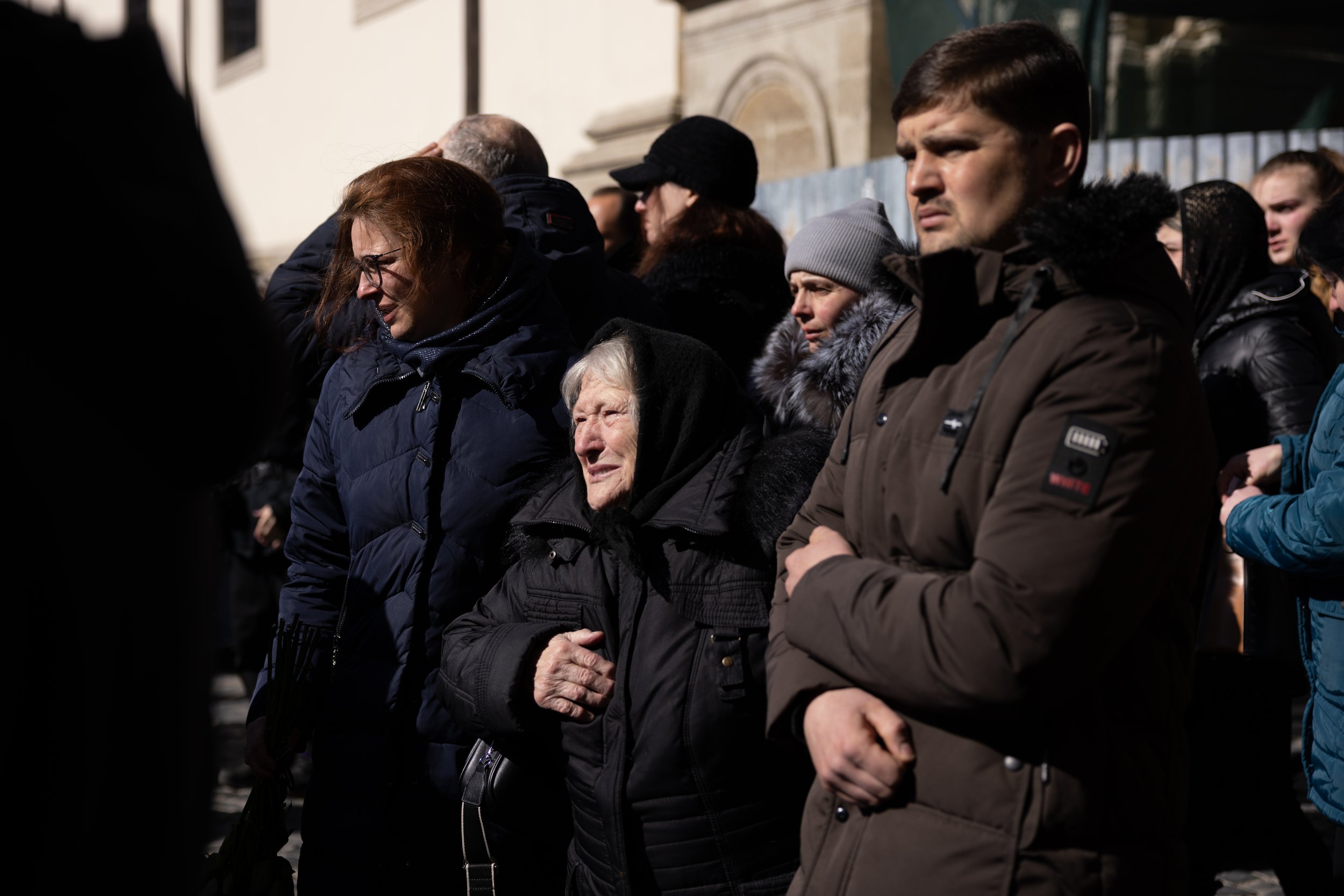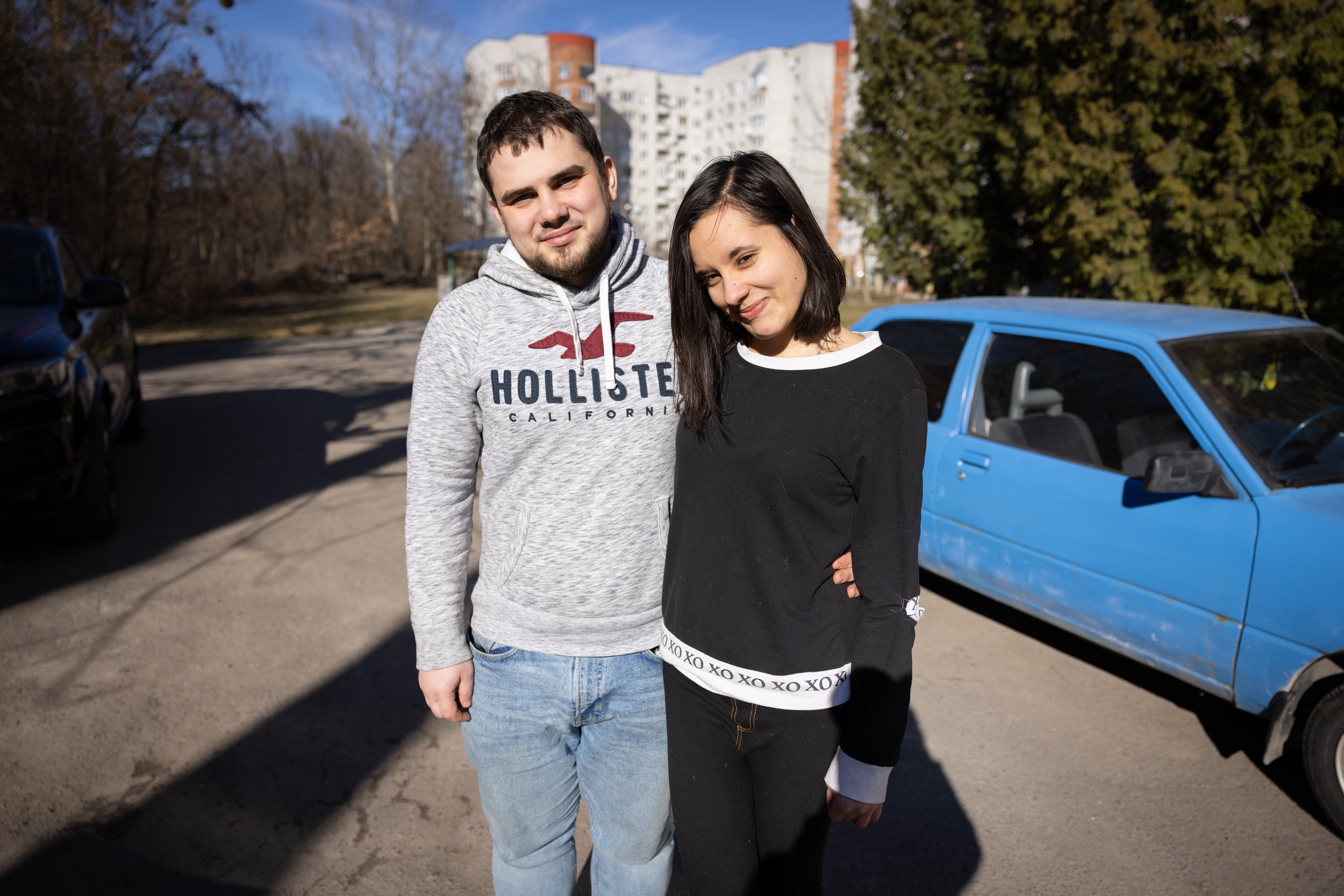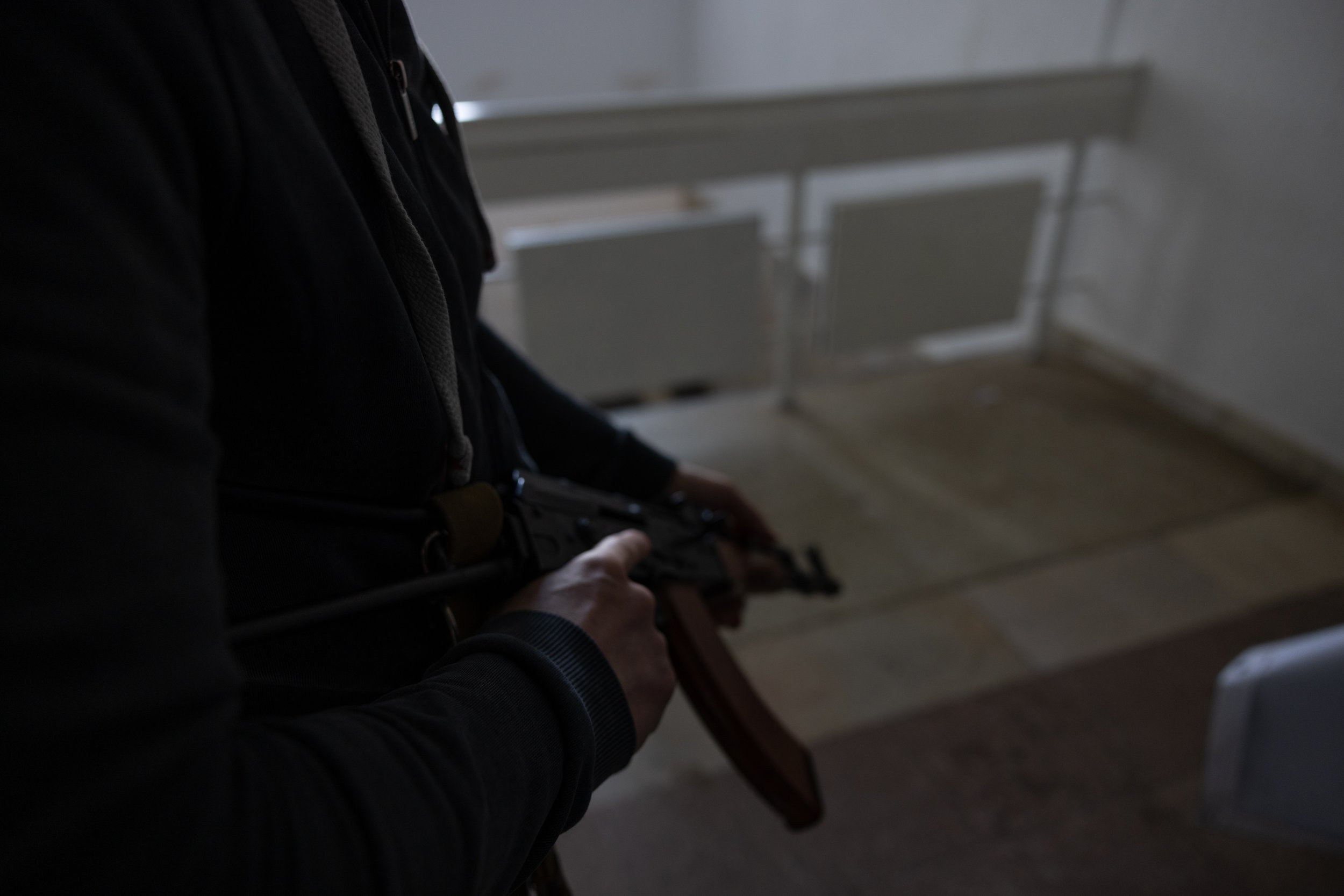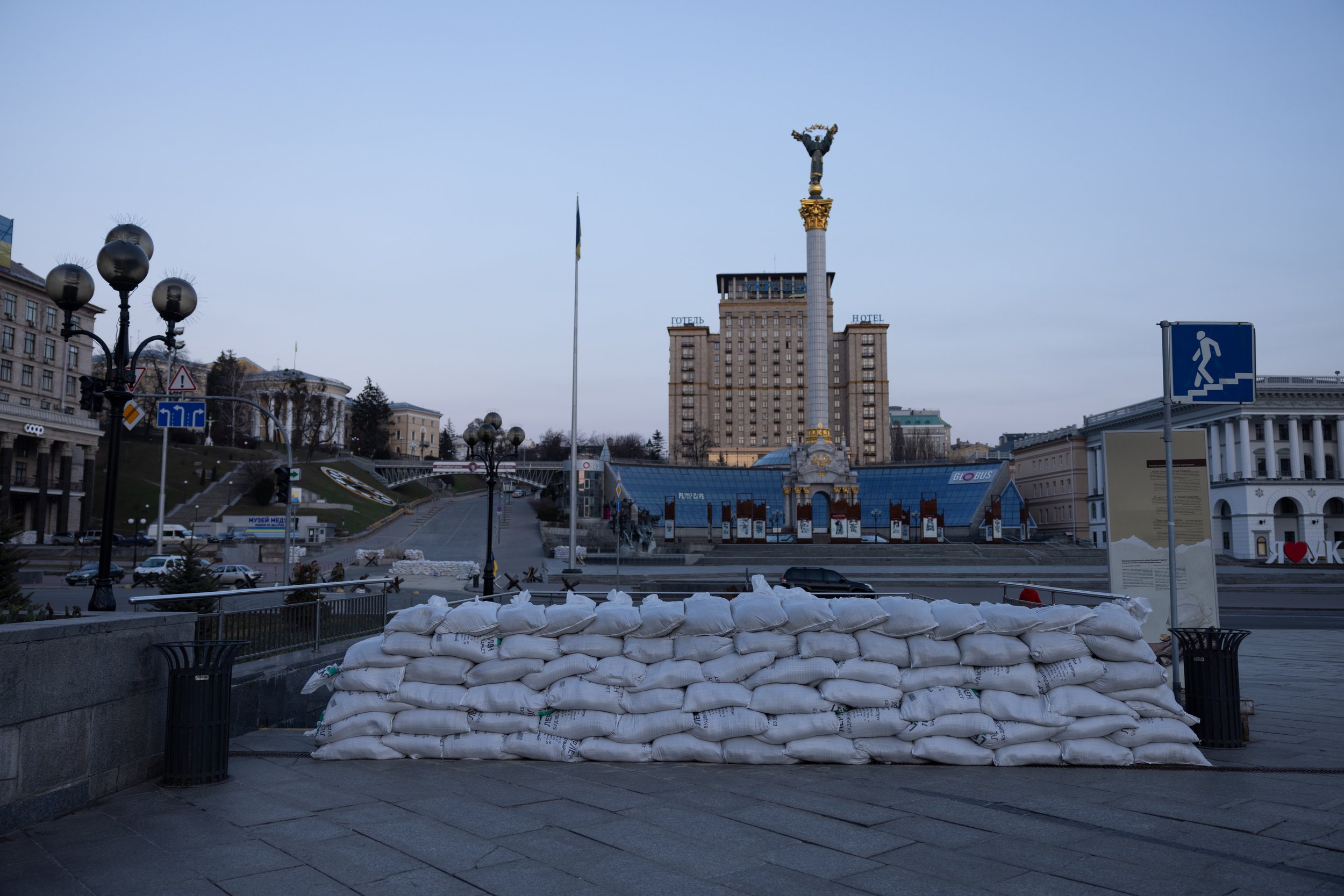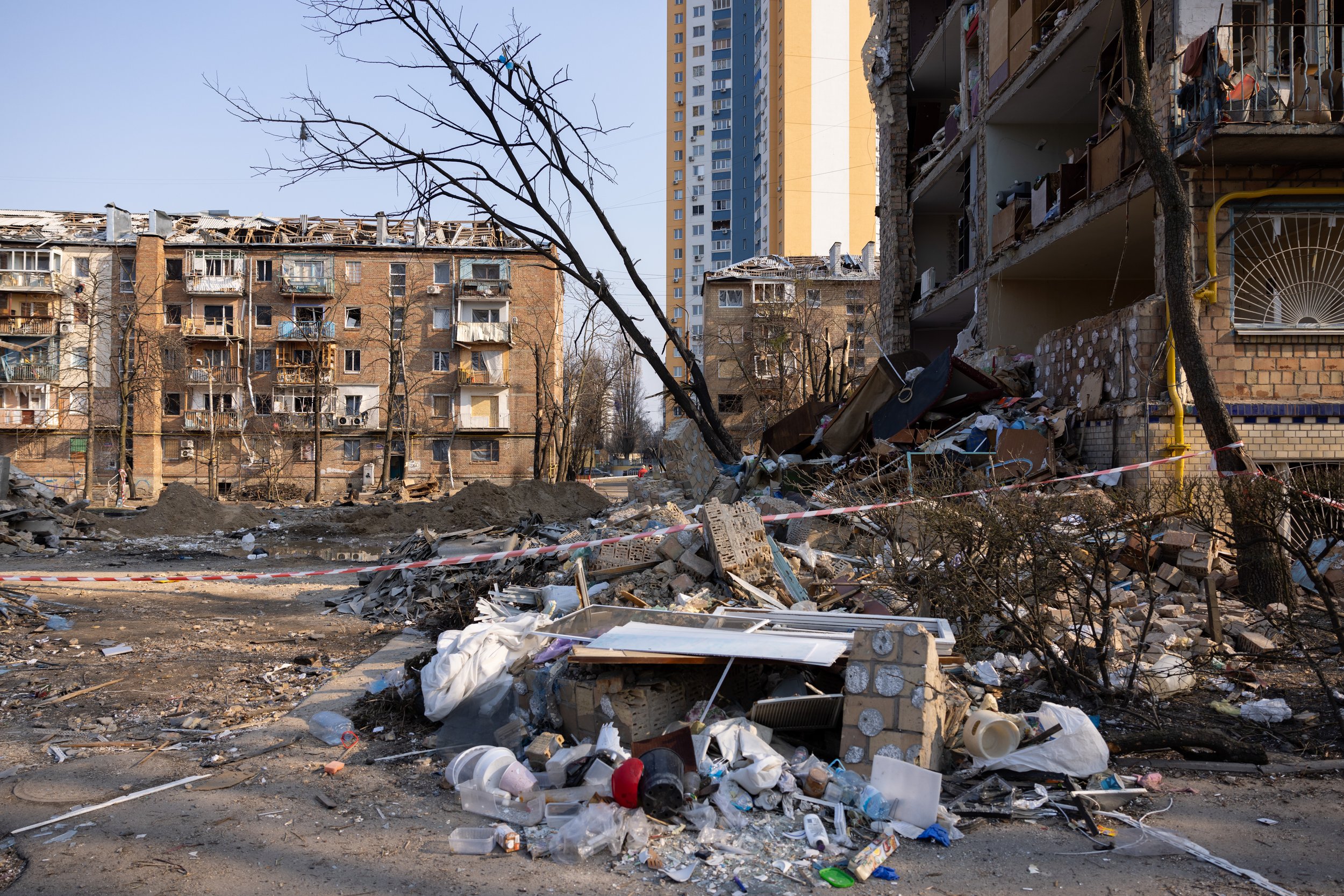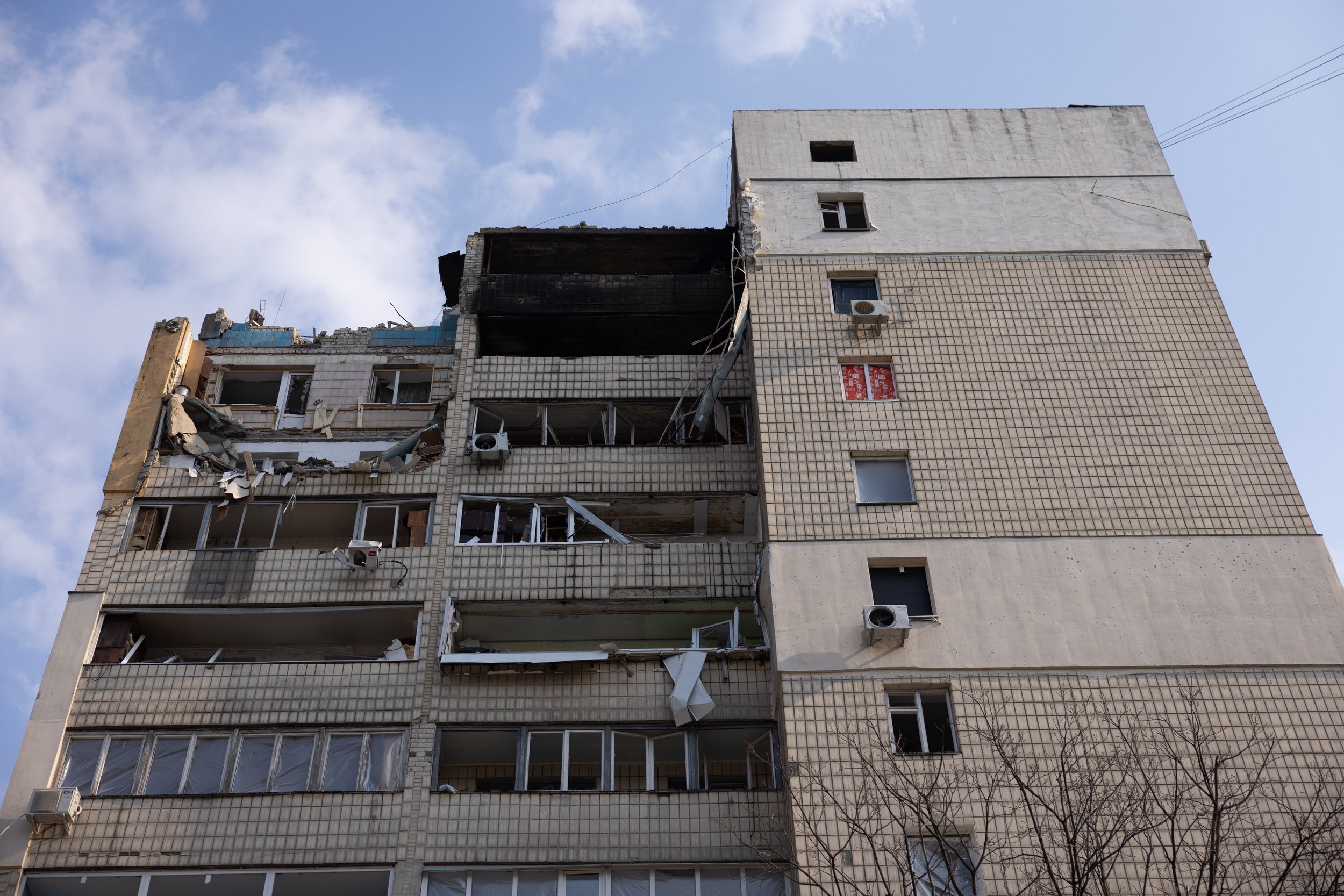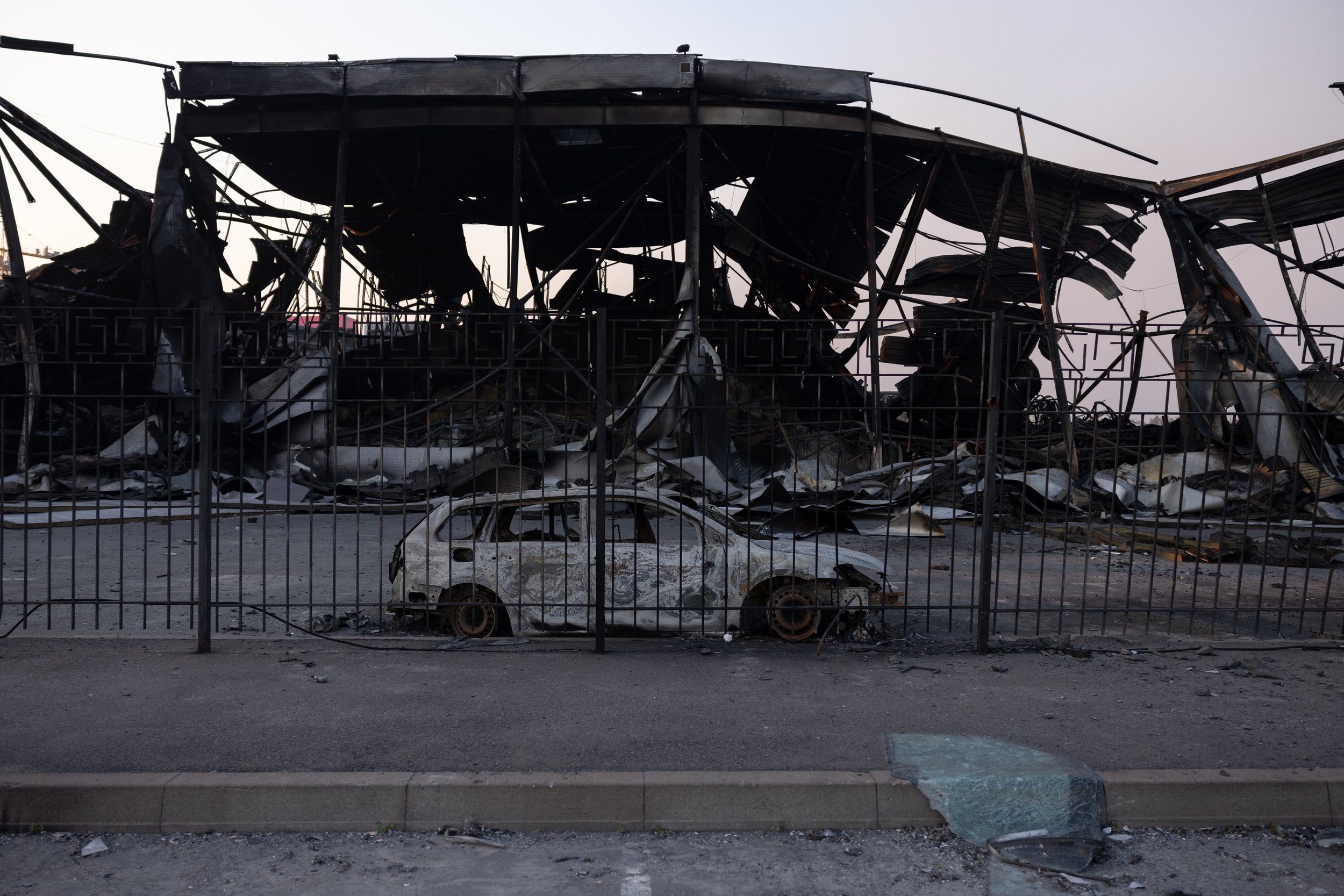// Never Ending War //
Ukraine has been at war with Russian separatists in the east of Donbas (Donetsk and Luhansk) since 2014. Over 13,000 soldiers and civilians have lost their lives in this region. The conflict slowly began to disappear from international news until it was reignited on February 24, 2022, when Russia did the unthinkable and invaded the sovereign territory of Ukraine.
Intelligence from the United States and several European countries had been warning of the possibility of a larger move by Russia for months. There was satellite imagery and accounts from people on the ground in Russia of troop and military equipment movements almost daily. Most people, including many Ukrainians, viewed Russia’s approximately 150,000 (some reports claim up to 190,000) troop build-up along its borders as nothing more than posturing, a way to force Ukraine into submission and scare them. However, on February 21, Putin made a speech recognizing the independence of Donetsk and Luhansk. The purpose of his speech clearly was not just to declare them as independent. There was a larger political ambition in mind, possibly to remove Kyiv’s political leadership and replace it with Russia’s own puppet government.
Putin, the Kremlin, and supporters made a serious miscalculation by believing many Ukrainians (specifically Russian speaking people) would view the Russian military as liberators and welcome them into cities like Kharkiv and Sumy like they did in Donbas in 2014. Instead, they met fierce resistance from the Ukrainian military, territorial defense units, and even unarmed civilians, who used their numbers to prevent Russian units from moving deeper into the country.
The Russian government stated that it was conducting a special military operation and was not technically at war with Ukraine. Their goal was to de-Nazify Ukraine and liberate Ukrainians who Putin viewed as Russia’s brothers. Other goals were for Ukraine to remain independent, not join NATO or the EU, significantly reduce its military capabilities and not be able to receive arms from western nations, and reorganize Donbas and Crimea (which was annexed in 2014 as part of Russia) as independent territories. Ukraine’s President Zelenskyy had only one demand, for Russia to remove its military from Ukraine.
The war in Ukraine has now approached its second month. Cities around Kyiv, such as Irpin, Bucha, Borodyanka, and Chernihiv, have been taken back by Ukrainian forces and are currently under their control again. Many civilians are even returning to their homes in an attempt to pick up the pieces and start their lives anew. However, the war is still raging on in the east, and many military analysts believe a new push by Russia will begin soon. Many people believe there is no end in sight for this war, and everyone is wondering when the suffering and destruction will come to an end. One thing is certain, the people of Ukraine are more united than ever before. They are strong, resilient, and determined to win.
Kyiv, Ukraine. 23/03/2022. A makeshift ambulance driving through the streets of a destroyed apartment complex which caught on fir.
Kyiv, Ukraine. 28/03/2022. A couple that just evacuated their home from Irpin.
Lviv, Ukraine. 09/03/2022. Soldiers saying goodbye to loved ones before departing Lviv for the eastern front.
Kyiv, Ukraine. 23/03/2022. A man picking up the pieces and sorting through his personal belongings after a rocket landed inside a residential neighborhood on March 18, 2022 in Obolon district, northwest part Kyiv causing significant damage.
Kyiv, Ukraine. 23/03/2022. Remains of a destroyed business center in Chaiki village west of Kyiv near Irpin that occurred on March 3, 2022.
Kyiv, Ukraine. 24/03/2022. An apartment building on Sevastopol Square, Lobanovsky Avenue hit by a Russian sea based cruise missile at night. Floors 17 to 21 were damaged killing two people and injuring 6 on February 26, 2022.
Kyiv, Ukraine. 24/03/2022. A woman walks past the residential apartment building on Sevastopol Square, Lobanovsky Avenue hit by a Russian sea based cruise missile at night. Floors 17 to 21 were damaged killing two people and injuring 6 on February 26, 2022.
Lviv, Ukraine. 11/03/2022. Funeral for Taras Diduh, Dmytro Kabakov, and Andrii Stefanyshyn at the 17th century Saints Peter and Paul Garrison Church in Lviv.
Lviv, Ukraine. 11/03/2022. A woman prays inside 17th century Saints Peter and Paul Garrison Church.
Lviv, Ukraine. 17/03/2022. Forcibly displaced people arriving and departing Lviv railway station.
Lviv - March 8, 2022
I crossed into Ukraine at Hrebenne, Poland to Rava Ruska. There were only 7 other people on my bus from Lublin, Poland; one was a boy in his teens and the rest were women and young children. They didn’t speak English, so I don’t know their reason for going back to Ukraine. However, many Ukrainians I have spoken to say they don’t want to leave their home and go to the U.S. or EU like many westerners may believe. My first thought was that Ukrainians are strong-willed people who show great love for their country.
As we left the Polish/Ukrainian border in route to Lviv, there were miles of cars, buses, people, and large supply trucks that had been waiting hours to cross into Poland. The situation seemed less chaotic than what I saw on the news a week earlier, but the line stretched for miles to Rava Ruska. There were dozens of makeshift road checkpoints organized by civilians and some military. Barriers were constructed of metal blockades, tires, and sandbags. People were flying the Ukrainian flag. Some flew a red and black flag, which I learned was the Stepan Bandera (a Ukrainian nationalist) flag. This country’s status as a nation at war was very clear. This is the same country that lost millions of lives during WWII.
Everywhere we drove, there were Ukrainian flags flying. I could feel the patriotism and see that the people were united.
This is my story from my eyes in Ukraine, a long-term documentary project that I will be working on during and after the war.
09/03/2022. Soldiers walk past blanketed statues at Boim Chapel in Lviv.
Lviv - March 9
I spent the majority of my day at the train station for my first time. There were moments of pure chaos where people were crossing the tracks with their children and pets and carrying large suitcases. I didn’t know where they came from or where they were going, but I saw a look of panic and uncertainty on many peoples’ faces. Sometimes there were moments of pure calmness. Listening to the sound of arriving and departing trains brought some ease and gave me a nostalgic feeling. There was such a strange mix of emotions.
A young man from Germany who brought around 6,000 euro worth of military medical supplies and first aide to give to soldiers and those on the front lines. He gave me a medical kit and tourniquet, which I handed over to a soldier named Elijah who I met before he left for Dnipro with his unit. Many soldiers were saying their goodbyes to loved ones, mostly girlfriends and wives, before they left for the front lines.
Saying Their Goodbyes
It was nearing the end of Day 16 since the beginning of the larger war in Ukraine. More soldiers were leaving for the front lines and many men were also being called up to serve. Soldiers were saying goodbye to their loved ones; unfortunately, it would be the last goodbye for some.
Elijah
Elijah Boiko (20) was leaving his fiancé and family behind. He told me he hopes to be finished quickly so he can go back home, get married, and start a family.
These stories are all too common amongst soldiers around the world fighting in wars.
11/03/2022. Left: Elijah Boiko, 20 years old preparing to depart Lviv to the eastern front.
Lviv - March 11, 2022
The Church of the Most Holy Apostles Saint Peter and Paul. Mass was held around 9:00 AM. The interior of the church was stunning; the light pouring in through the windows was magical. A funeral was being held there for 3 soldiers. Sirens went off towards the end of the ceremony. It was such a strange experience to feel the calmness and sadness of the funeral and then hear the sirens going off. The sirens induced panic in some people, but no one sought shelter and life carried on.
Mourning the Dead
Three soldiers who were killed in the war with Russia, Taras Diduh (aged 25), Dmytro Kabakov (aged 58), and Andrii Stefanyshyn (aged 39), were mourned by their families and several dozens of Ukrainians at the Church of the Most Holy Apostles Saint Peter and Paul in Lviv. They were laid to rest at the city's historic Lychakiv Cemetery.
Taras Diduh, Dmytro Kabakov, and Andrii Stefanyshyn were laid to rest at Lviv’s historic Lychakiv Cemetery.
Taras Diduh, Dmytro Kabakov, and Andrii Stefanyshyn were laid to rest at Lviv’s historic Lychakiv Cemetery.
Lviv Railway Station
Life continued as usual in Lviv’s central railway station. The smoke coming from the trains was nostalgic to me; it was somewhat familiar, like something out of a book or movie. The warm sunlight helped cut through the cold air.
Forcibly Displaced People of Ukraine
The refugee crisis in Ukraine has continued to grow due to Russia’s invasion on February 24, 2022. More than 4.4 million people have left Ukraine since April 7, and it is estimated that 6.5 million people are displaced within the country. Many are in Lviv, where there continues to be a housing shortage due to the massive influx of people leaving the east and heading west. A large number of refugees are from Kharkiv, while others are from Mariupol, Dnipro, and Donbas. The list goes on, but something that every refugee I spoke to has in common with one another is that they want to return home and rebuild their lives.
Maria
Maria Kaliuzhnaya (24) from Kharkiv. Her hobbies include poetry, painting, and illustrating. She and her husband Dmitry traveled to Lviv by car, fleeing for their lives like many others. She is from Pyatihatki, a neighborhood of Kharkiv. Her neighbor’s home was destroyed by a Russian rocket, and her home was destroyed the next day. She lost everything.
Maria saw a lot of destruction in Kharkiv. Russian soldiers were shooting at civilian cars while she and her husband were trying to leave. She told me the passenger side window and windshield of her car were shot. Everyday, they passed by areas that had experienced damage from explosions. They had to run to different hospitals, which were in very poor condition. Every location they arrived at was short on food and medical supplies.
Maria told me she doesn’t feel safe anywhere right now, not even in Lviv. She currently has no plans and is living each day as it comes while waiting for a time to return back to Kharkiv and restart her life. Her husband Dmitry had plans to open an Asian restaurant. However, now they are just cooking in the shelter for other people. She also mentioned that many Russian people don’t understand what’s happening in Ukraine and they think it’s a joke.
Maria asks “What’s the reason for this war?”
When she and her husband return to Kharkiv, they are going to build a new home and try to pick up where they left off. She said they don’t want to leave Ukraine because it’s their home.
Crimean Tatars Refugees
Edem (aged 54), his niece, Tamila (aged 38), and her mother, Lenara (aged 64), are refugees from Crimea.
May 18, 1944: After WWII, Stalin deported almost all people from Crimea, including Crimean Tatars, to other countries in Central Asia. Only Russian people were allowed to stay.
Edem, Tamila, and Lenara ended up in Uzbekistan, where they were treated well. Edem works as a handy man, providing services such as flooring and painting for peoples’ homes. Tamila works as a florist. She said many of her friends still live in the villages near Kyiv, including one of her colleagues, who, like many other young men, decided to take up arms and join the territorial defense units.
…“From my grandmother’s words, she was a young girl; all their men were at war, so all that was at home were women and children. My grandmother was 11 years old when the soldiers came with guns and took all the women and children and put them on a train meant for animals. They cleared all the villages of our people and sent them to Uzbekistan. Some went to Kazakhstan or Tajikistan. It took 4 to 5 days to get to Uzbekistan. People died on the train, and some women delivered a child during this journey. They took nothing with them except maybe some money; they came pure, and all their lives were left in Crimea. The people of Uzbekistan treated us very well. They were kind, brought us food, and helped with clothes. Our people took up jobs in agriculture. A new life started in Uzbekistan. My mom was born in Uzbekistan and we also were born there. However, in 1996, my father went to Crimea because they really wanted to return. They tried to take empty land to farm. Tartars started to return when the government agreed to this. In the 1980s, it was difficult for anyone to return. My father built a home for us and took us from Uzbekistan to Crimea.”
“We moved to Crimea with our parents when we were just children and started a new life there. Crimea was Ukrainian at that time, and it was good for us Tatars. We had freedom; you could say what you wanted and do what you wanted. However, when the Russians came in 2014, the nightmare began immediately. They didn’t want Tatars there. I left for Kyiv many years ago, no connection to when Russia annexed Crimea. On the 5th of March, I left Kyiv by train to come to Lviv.”
“In Crimea, I finished my education at an economic university and worked as an accountant for a company there. In Kyiv, I initially also worked as an accountant but decided to leave that job and find more interesting work. I decided to take another job as a florist, which gave me a lot of nice things, including new friends.”
“My grandmother (mother’s mother) was 11 years old when she was forced to leave Crimea and go to Uzbekistan. There were 4 children in her family. She had one sister who was 4 years old and died on the train to Uzbekistan. When they came to Uzbekistan, they didn’t have food and were like gypsies. One man helped them by bringing them to a shelter for children. They grew up in that shelter and started to work when they were teenagers. In Uzbekistan, Lenora worked in a kindergarten. Her mother was a seamstress. She had lived in Uzbekistan for 34 years with children.”
“Lenara’s father (Tamila’s grandfather) worked in a factory and was a car mechanic. In Uzbekistan, he worked as a mechanic and was a romantic guy who painted one car the color of Lenara’s eyes, a beautiful blue color. They drove in that car from Uzbekistan to Crimea. Her father is still in Crimea and calls them every day. He has been very worried about them and the situation in Ukraine.”
Many Ukrainians are taking up arms and joining the military or territorial defense units. However, some are using their skills to help the war effort in a completely different way. One of the first ways many people of all ages have helped is by making camouflage nets for the soldiers. There are dozens of locations throughout Lviv where anyone can donate their time or even their own clothing to help make the nets. I spoke with some volunteers from Donbas, Mariupol, Lviv, Kharkiv, and Kherson.
I met a woman named Olga Kozyrmang from Mariupol. She said there are dozens of Russian bodies there and Russia has not taken their dead. The dead Russian soldiers have been left behind to decay and be eaten by dogs and other animals. I could see the sadness in Olga’s eyes, as well as two other people I spoke to from that city. They were upset that the U.S. and Europe were playing politics and not doing enough.
She told me that Russia shot at a Red Cross building and even a children’s hospital. She also mentioned that there are more civilians who are dead than soldiers, and 4,000 people are trapped in Mariupol without electricity and heat. The weather is still cold and fighting is still occurring around the city. Like most Ukrainians, Olga suggested the sky be closed, or Ukraine should at least be given more air power. They need help immediately because people are suffering. They don’t have any medicine or enough food due to there being no humanitarian corridors open from the Ukrainian side. Russia has been preventing this and only allows it on their side. They also only allow people to escape into their side.
Ivan and Nadia
Ivan Brusak (27) and Nadia Kopiika (22), two volunteers with different pasts. Ivan lived in Lviv for 6 years and Nadia is originally from Mykolaiv.
They met here on March 24 while making nets, and they started dating during the war. Nadia originally was a construction engineer but decided to devote her time to the war effort instead of leaving the country and working. Nadia told me “people understood we were unique and understood what we were fighting for.” She never met so many different people before these days. “It doesn’t matter how different we are, what matters is we are united.”
Ivan has a PH.D in geodesy and said Ukraine needs air support, weapons, and money for rebuilding. “Ukraine, we are brave, and it’s our land and our country.”
They are both volunteering. “Many people have been asking how they can help. Everyone wants to help.”
“Ukraine, we are brave and it’s our land and our country.”
“It doesn’t matter how different we are, what matters is we are united.”
Many Ukrainians have chosen to take self defense classes at one of the numerous locations throughout Lviv and the country. They learn weapons handling and first aid. Most have never held a gun in their lives but believe now is the time. The classes are free and are held every day. Some days, the locations are completely packed with people.
First aid class being held in Lviv, Ukraine. March, 2022
One of the several weapons handling instructors.
Yustyna
Yustyna was forced to leave Kyiv, where she lived for 3 years. She attended classes in Lviv for weapons training and medical first aid months before the invasion. She said they never imagined war would be a reality. The mood of each Ukrainian has been constantly changing from day to day. Some days, the people are enthusiastic and believe they will win. Other days, they are depressed. Yustyna is grateful for the weapons, medical supplies, and humanitarian aid they have received from the U.S. and EU. However, she believes closing the skies would be the most helpful, especially for civilians. “If we are Nazis, why attack the Russian speaking region first?” she told me. Yustyna wants to join the territorial defense, but they will not accept her right now because she doesn’t have any combat experience.
“They (Russia) are unmotivated, they really young people who are just a resource for Putin. He doesn’t consider them as people, they are just a resource and he is a consumer of their lives and so on. We are different, we are trying to save everyone, we are trying to save animals, of course children, all the elderly people because our values are to save everyone. But they (Russians) are considering them as just a resource to kill Ukrainians.”
“They will die here (Chechens), of course we will have losses, and of course it is not really good for us, but these Chechen guys it is a fake, because Russians don’t trust Chechen troops, they don’t give them a lot of power, for example there are no people in tanks or air defense and so on. They are just, you know when there was a the Chechen war, Russia had a huge fear of Chechen guys and they think that Ukrainians will also be afraid, and they are trying to make us afraid like we will ask Chechens to kill you, but we are laughing because they will die here as well as all other Russian occupiers and for example in Kyiv a few Chechen groups, all of them were filmed recording a few TikToks but now they are dead. So its huge fake news by Russian propaganda but it is sad that we here in Ukraine are suffering because they are killing our people and destroying our infrastructure because for the last few years our roads and bridges were built and now they just just did everything to destroy out country, but still we will stand tall and do everything to make our Ukraine more strong and I hope that we will win really really soon, it is my dream like many many people we are praying everyday please let it be our victory and everything is over. You know occupation it is not an option for example in Kherson 10,000 people went to the meetings with Ukrainian flags and so on, they are no afraid of being shot because it is more scary to live under occupation because it will be a huge terror, now it is a terror but still we have a chance to kill all of the occupiers.”
“I don’t consider them as humans, because they are killers.”
“Before the war I was an animal rights activist and of course I am a person who appreciates every life, but for now I realize I can hate so much these killers and I don’t consider them as humans and they don’t deserve to live. Because they just want to kill us. I am not a person who wants to commit suicide, I don’t have any empathy to them. Probably after the victory they go away from Ukraine we will reconsider everything but for now the situation we want them out of Ukraine.”
“Also you know there are some stereotypes that they don’t know where they are going, it is not true, it is a lie because we have a lot of their calls and they are talking between each other and they are talking about their terror of civilian people, and they are just lying when they get captured. Our Ukrainian armed forces don't torture them or so on, they just keep them captured and that’s it. And sometimes I think that I wouldn’t be so good to them, but still I understand that we are not beasts and we are just trying to defend ourselves and don’t want to become like beasts and be like them and do what they do.”
“We want to continue to live a democratic life, and I was an animal rights activist, I had a chance and and opportunity to go to any meeting I wanted, but in Russia for example policemen go find and beat people and it is not possible to have any kind of (democratic) meeting in Russia. …. I don’t want to think about Russia, I just want to think about our future so I don’t care about them.”
“In Kyiv there are a lot of animal rights shelters that awes bombed and now the poor animals do not have any access to water or to food because Russian occupiers are just shelling anyone that wants to try to get to this place because not these shelters are occupied. Gostomel it is also a shelter near Boridyanka and it is awful because during last 3 or 5 years I was trying to help animals and to save them and now I realize they are just starving and dying because of absence of water and of food.”
“We are trying here in Lviv to collect a lot of food but there is no logistics to Kyiv especially to these shelters, and we are helping with evacuation of animals as well for example lions, birds and a lot of zoos were also bombed. Poor animals are also dying because of stress because of the noise and they cannot manage the stressful situation.”
“We have a logistics between Lviv and Kyiv but the suburbs do not exit anymore because Russians totally destroyed everything, all the buildings were shelled, they don't let anybody go to these shelters. A few volunteers wanted to go to these places and they were shot, 4 people were trying to reach Gostomel and were killed by Russians, and I am an activist of Ukrainian organization of animals and we are waiting about every case and also I am so glad when I see our armed forces both evacuating people and also they are are evacuating animals as well.”
“It is a sad situation but still for example a few days ago our organization found a new warehouse here in Lviv and we collect all the animal food to send it, to deliver it to Kyiv and a lot of areas an district in Kyiv have not only supplies for people but also no food for animals so we are trying to help them, our volunteers in Kyiv just spread the food between districts between people who have pets, and we are trying to help them.”
“If we are Nazis, why attack the Russian speaking region first?”
Vicktor
Vicktor (40), from Kyiv, worked as an export sales manager and owned a glass factory. His wife and daughter are now living in Germany while he stays in Lviv waiting to see if he will be given orders to fight. He cannot leave the country.
“We stayed home in Irpin from 24 February and on 5 of march Russian tanks entered our residence, they organized something like office of their forces inside our residence. They broke (destroyed) every flat in our residence, the broke computers, our phones, everything which looked valuable to them. When we asked then not to destroy the flats that we would open the doors they refused and they just broke every door. Then they gathered all the people which were left from this date, we lived in the basement with other people, 40 square meters, so sometimes we were allowed to go outside to cook food on the fire. Sometimes these soldiers by the way there were like 5 waves of such soldiers. The first wave threatened us, broke our phones, and broke the doors, and broke into the shops, they stole everything from the shops, they put the food outside and gave this food to us, like they saved us, saved our lives and wanted us to eat something. There was the second wave after this wave and the people didn’t see what the first wave did, so they came and they believe that everything which is broken now is made by our Ukrainian forces and by us, ourselves. They told us such bullshit that it couldn’t be believed, like children are violated by our troops, that Ukraine wanted to fight Russia, that our rockets directed towards their country, that they save us from nationalists, that some few nationalists have Ukraine and they make us do some horrible things and everything will be OK and maybe we will be deported to Russia to save our lives, and maybe it will be tomorrow and maybe tomorrow Kadyrov soldiers with come here to make some order.”
“Well everyday brought us some horrible news, and from the 7th day we saw a column of our people going by car or by foot near our residence, so 4 of our cars out as many people inside and while these tanks were directed at us and the soldiers kept and eye on us, we just took such a big risk and and left this residence, and we came across 5 other Russian waves and everyone of them looked at us with their weapons aimed at us, and each time we knew that anything could happen, they could shoot, and when we were in a safe place and renewed our phones and our since cards we got to know that 2 days before us the column of people tried to escape and were shot and 2 days after us also were shot trying to escape. So I know that some people were killed while escaping, so that I know that we are quite lucky, many people were left there in the basement and we ave the information about heir local office in our residence to our police.”
“We had a car and left the residence by 4 cars, 1 car made its way to Odessa, 1 to Bila Tserkva, and 2 of us to Lviv. [They left Hostomel] Originally we live in Gorlovka and left in 2014, this is different sorry!”
“Yes, we had a glass factory in Hostomel and it is in ashes now, it is a little town like 10,000 people, its not too big like 10km long, so it 10km from this main place and they continued on ordinary people.”
“Well I don’t have any military experience, but now with these courses I would like to get some, maybe we would get some extended course, somewhere else because I don’t want to have any Russian order here.”
“You know Lviv people are not like other people from eastern Ukraine, the people also fight and are heroes but the people here will fight Russians from every yard, every window, so people here are nationalists by they defend their nationality for maybe 100 years which is conscious and which is historically proven. So if even if Kyiv will be defeated, I don’t believe it, I only believe in our victory, Lviv will never do, and I believe that it is sooner that Russian people end this war but Ukraine will not surrender, and I don’t have other ways to have more knowledge about weapons, I know that a lot of occupants and Russian solders are hiding in Forests now and they don’t want to be killed and I know Ukrainian head office, government they mentioned that after we defeat the main enemy we will look for them in the forest. And I would like to be one of the first people looking for them in the forest, and in the neighborhood where I live, so I would like to look for them and show that this is our land, this is our country.”
“We will fight for our future, so I think I have time here to know more about weapons and first aid, because I understand now that Israel is correct and is right and it is quite normal that every citizen can handle a gun and knows what to do with it. You don’t need to fight but you have to know what to do with it if you have it.”
“We will fight for our future, so I think I have time here to know more about weapons and first aid.”
Voldymyr
Voldymyr (65), originally from Georgia and wants to fight. His son has been part of the Ukrainian special forces in Donbas since 2014, and he continues to fight in the east. He said he sends his son messages once a day to make sure he is okay. His son has confirmed that many Russian soldiers are helpless. They are getting beaten, and many have died. He said they come in waves, one after the other, like they did during the Soviet Union days, and they have no respect for their dead.
Ukrainian special forces say they continue to defeat Russia on the ground, but Russia has too much air superiority, which is prolonging this war. Voldymyr’s son believes the war would be over in a few days or weeks if the Ukrainian military had better air power. Voldymyr stated “Our forces will not stop until Putin and his forces are beaten. They are animals.”
“We loose and we cannot go forward because of the skies. So if they took care of the sky this war would be over very quickly then..”
“They (Russia) don’t have enough qualified soldiers and they send mercenaries, and they send people from border cities and young people without combat experience.”
Voldymyr has been a citizen of Ukraine for 40 years, and he is ashamed of other European people. He believes, if Putin defeats Ukraine, they will go further to Lithuania, Latvia, Estonia, and other nearby countries. He also mentioned that the Georgian parliament is Russian at heart.
Discovering the Past
During the first week of March in Lviv, old bomb shelters that had been buried after WWII were dug up again to be used if Russia attacked the city. Lviv was once part of Poland and the Austro-Hungarian Empire. Many of the bomb shelters were actually built during WWI and reused during WWII. After the second world war, they were buried with the expectation that they would never be needed again. It is said that all the tunnels connect and lead to the city center high castle, but this could just be an old rumor. Many of the old bricks have Polish maker marks on them.
Kviv - March 2022
Today, Kyiv is like a ghost town. There are some civilians here and there, but it’s mostly just checkpoints and journalists. One day, I heard beautiful but eerie music outside my window. It sounded like WWII era music; I assume it was an old Ukrainian classic. The timing was strange but it fit the mood of the city.
There are checkpoints throughout Kyiv, and you have to show your passport at some of them. However, most just require your press accreditation. Many of the individuals manning the checkpoints are civilians or territorial defense units, and some are military. Some of the people will greet you with a friendly smile while others are strict and don’t look very happy. Of course, it’s for a good reason if they aren’t warm and welcoming, as they must protect the city from saboteurs.
Many of these checkpoints are riddled with tank mines below hedgehog tank traps. There also are spikes and spike strips. Some locations even have dug-in trenches. It’s a surreal experience to see Kyiv like this. I was there less than 5 years ago, and it was a city full of life at that time. The strange thing is that some civilians are trying to live their lives as if they are not at war. There are children playing in the parks or riding scooters, people walking their dogs, and shoppers going about their usual routine at the markets. Some of the streets are still packed with traffic as well. Of course, daily activity within Kyiv is nothing like it was before the invasion on February 24.
Maidan Nezalezhnosti (Independence Square), Kyiv. March 25, 2022
Oleksandr
Oleksandr’s (74) home was destroyed and his personal belongings were left a mess n March 18, 2022 at approximately 7:30 AM, after an explosion occurred outside the apartment building. He has been a resident of Kyiv for over 70 years and had lived in that building for 8 years. The explosion took place in Obolon district in northwestern Kyiv, not far from Bucha and Irpin on the line of contact. It completely destroyed one side of the building, and Oleksandr said he initially had no time to be scared. However, once the explosion was over, he was afraid the other side of the building might collapse. Thankfully, no one in that building was killed. Some people were injured, though, and damage could be seen throughout the property. A nearby kindergarten was damaged by the explosion as well.
Oleksandr will be staying with his daughter in her apartment for an unknown period of time.
March 24, 2022
I awoke to the national anthem and heard faint sounds of shelling in the background. It reminded me of a symphony orchestra. Today also marks 1 month since Russia began a full scale invasion of the sovereign country of Ukraine.
Kindergarten that had taken some damage from the blast on March 18.
On March 15, a 16-story residential building was attacked by Russian forces in the Sviatoshynskyi district of Kyiv. At least 4 people were killed and many more were hospitalized. Firefighters rescued 48 people from the fire that had broken out. Several other residential buildings were also attacked by Russian forces in the same district, as well as Osokorki and Podilskyi.
On March 16, shell fragments hit a 12-story building in the Shevchenkivsky district of Kyiv. The 12th floor collapsed, and a 9-story building nearby also took some damage. Two people were injured and 35 were rescued, according to local sources.
On February 26, a residential apartment building on Sevastopol Square, Lobanovsky Avenue, was hit by a Russian sea-based cruise missile at night. Floors 17 to 21 were damaged, killing two people and injuring six. There is a medical center and children’s hospital across the street, and Сікорського Airport is located just 2.3 km away. The destruction looked like something out of a movie. There was debris all over the street for hundreds of meters.
There’s some beautiful in all this but in some strange ways, people are resilient here. There are signs of life, children playing, people getting groceries, walking their dogs in the streets, even with the sounds of guns and artillery in the background, it’s surreal in a way it’s become part of life here. Not everyone wants to leave they tell me this is their home they don’t want to run away to Europe or the US. And those who have left are counting down the days to return back to their homes, rebuild and start their lives again.
The war continues. Russia has made announcements that they are moving away from Kyiv and are going to focus their efforts on Ukraine’s eastern region. Few people see this as a good will gesture. Many people like myself are skeptical and believe that Russia is just attempting to save face rather than admit they failed to take Kyiv. They could be regrouping because of strained logistics, supply shortages, casualties, and low morale.
Destroyed business center in Chaiki village, located near Irpin and west of Kyiv on March 3rd.
Many were veterans since 2014, and some were even special forces. They showed me photos of dead Russians they recently killed outside Kyiv and Donbas region. The photos were very personal to them. In a way, the pictures were like trophies to them. I was told the soldiers were very happy to see and meet me, mostly because I’m also ex-military and they could relate to me. When I stepped inside the compound/barracks they were living in, it immediately brought me back to my Army days. It was such a strange, but welcoming, experience. We shared a similar mentality; a familiar brotherhood that made me feel welcome. They liked that I wasn’t some random journalist from the news. They showed me a different kind of respect and openness, which was a raw feeling. The soldiers said they prefer British LAWs over the Javelins because they are easier to use, but the Javelins are better for distance.
Many of the guys were from smaller villages outside of Kyiv. Some were from Luhansk in Donbas and had family members who worked as coal miners or factory laborers. They moved to Kyiv when things started to change there. Most of these soldiers had ordinary lives before the war. They worked normal jobs, played video games, and lived a lifestyle similar to people from western countries.
Left: Nazar (20) and Vlad (24) showing off some weapons. 26 March 2022
Vlad
Vlad (22) has served as a sniper for the Ukrainian Army for 4 years. He is originally from Khmelnitskiy, located between Ternopil and Vinnytsia. He says “It’s like Call of Duty in real life but without re-spawn or saved game.” He thinks and hopes Ukraine will win the war soon. Vlad said he appreciates everything the U.S. and other western countries have done for them so far. He hopes other countries will continue to provide them with weapons because it helps tremendously, and he also wants the skies to be closed.
“It’s like Call of Duty in real life but without re-spawn or save game.”
Captured Russian rifle by Ukrainian forces in March.
Nazar (20) is an engineer in the same unit as Vlad and is the youngest in the group. He is from Ternopil and enjoys his work in the Army.
March 28, 2022
Civilians were being evacuated from Irpin across the bridge to the center. I couldn’t get close to the bridge; I could only get close to the location where they were arriving, and I wasn’t able to spend much time there. Outgoing and incoming artillery could be seen throughout the day. I was about one mile away from the frontline. There was machine gun fire that I couldn’t hear, but I was told they were fighting Russian sabotage units that had been dug in the woods nearby.
There also were reports that Russia had tried to launch a counter offensive in the northwest and east on March 28, which could explain why there was so much artillery in the background.
Kateryna Pryimak
Deputy Chairman of the NGO “Ukrainian Women Veteran Movement”
She is a trained culturologist. Before the war, Kateryna worked at the Center of Contemporary Art. In 2014, she joined the ranks of the Volunteer Ukrainian Corps, m/s “Hospitallers,” where she worked as a paramedic for the evacuation brigade for 11 months. (Pisky, Butivka Mine)
After she returned home, she worked for a T.V. station. In 2018, she and her sisters began the Women’s Veteran Movement. She currently is working towards her master’s degree at the Kyiv School of Economics; the program is “Public Policy and Governance.” Kateryna represented Ukrainian veterans at the UN headquarters twice (CSW 63 in New York, Beijing + 25 in Geneva).
She is the laureate of the Euromaidan SOS prize.
Vitalina
Vitalina (30) is an Army veteran from Zaporizhzhia who was living in Lutsk. She was near Luhansk for almost a year in 2015, serving in the Ukrainian Army. She was in Maidan Square when the war started.
“...Near Luhansk was almost a year, I returned to a civil life in July 2015. But the war didn't stop and it didn’t stop for me. I can’t forget about this.”
The cross story:
“One guy who was one of the first to go to Donbas, he returned to Kyiv and said that he will never return to Donbas because it’s too difficult for him. He presented the cross to me and said it would protect me in fight and that it is a family relic and the cross was present to him from his grandfather.”
“This cross for me is about love with Ukrainians and about war with our enemies. I believe that I am protected by God, but it’s like a symbol for me.”
“My mother is in Zaporizhzhia, my father is in Donbas like Kaplan in the Ukrainian Army, and my brother is in Poltava. He is not in the military but spent a little time with volunteer battalion. He was in a fight a little time and sometimes with father with mission in Donbas. Then he worked in Poland and now he is back in Ukraine.”
“I don’t know what is my role but I wait for an opportunity to go fight. I don’t only want to fight, I want to be with the best and that’s why I wait. Now I do massage and help here because almost everyone has problems with spine or back. I have a certificate in massage and it’s very good to help these people. After one massage, they say they return to life.”
“This cross for me is about love with Ukrainians and about war with our enemies. I believe that I am protected by God, but it’s like a symbol for me.”
There is a room inside the organization where people prepare Molotov cocktails. It’s hard to stay in the room for an extended period of time due to the fumes. There also is a drone workshop where all drones (which are used both for surveillance and lethal operations) are built from scratch. Many of the parts are created by 3D printers. Before the Russian invasion, a lot of the volunteers in this workshop were repairing computers. Now they are utilizing their skills to contribute to the war effort.
Iryna
She lived in Kazakhstan from the age of 1 to 3 years. Iryna moved to Ukraine when she was 3 years old and lived in a rented apartment room. There was a guy who lived with them who came from a family repressed by Russia. The man used to give her candy, and her mother said it was not possible for her to remember this at such a young age. However, Iryna said she does remember, and she thought it was so nice of him to do that. In 2014, she contacted her father but ended up cutting off communication with him, as he is pro Russia. Iryna’s father told her what she should have done as a Ukrainian. He told her that she should listen to what the Russians are saying.
Iryna was living in Bila Tserkva when one of her friends said they needed someone to come to Kyiv and look after their cats. She decided to come and help out, but she did not want to spend all of her time in an apartment, looking after cats. Someone told her they needed more people to join Veteranka, so she became a member the first week of April. She also volunteered in Maidan (not in the revolution itself but in their city). Iryna said she understands now that she can live her life to the fullest when she is helping others. It makes her feel good, and she is happiest when she is helping people. She also said the experience has brought her good people. “We can’t choose our relatives but we can choose people who will work together as one, with the same views and ideas that we should protect Ukraine and defend it.”
Iryna is a widow; her husband died awhile ago. She has a 25-year-old son who still lives in Bila Tserkva. She takes people into her apartment who don’t have a place to live, so her son stayed behind to look after their place in Bila Tserkva. He didn’t join the Army because he was a university student, and there was a stable period in Ukraine after he graduated. He said he will join the Army if he needs to.
“We can’t choose our relatives but we can choose people that can help together with, with the same views and ideas that we should protect Ukraine and defend it. ”
Lena, from Kyiv, became a volunteer on March 4. She is the queen; she takes care of food and supply orders. The food is given to civilians and military inside and outside Kyiv. She is sometimes responsible for distributing medicine and military armor as well.
Veteranka, an NGO “Ukrainian Women Veteran Movement,” is a consolidation of female veterans that was created to increase the opportunities for self-realization in Ukrainian society. This organization provides food, medicine, clothing, and other important supplies to the defenders of Ukraine and those who have suffered from the Russian invasion.
You can learn more about some of the work that Veteranka does and donate if possible.
https://www.uwvm.org.ua/?page_id=3031&lang=en
Volunteers were preparing and cooking food for soldiers in and near Kyiv. Even though it was tiring work, they were extremely motivated. They sang songs together, told stories, and shared laughter. War may bring a lot of death and destruction, but it also brings people together and strengthens communities, sometimes under the strangest circumstances.
All volunteers play a vital role in the war effort to defend their country, their way of life, and the future they have envisioned for themselves.
One of the many volunteers, preparing food for the soldiers within and outside Kyiv on the front line. 25 March 2022
March 28, 2022
Civilians were making more sandbags and building them around statues outside the churches throughout the city. It was almost as if they knew something would be coming in the near future. Sand could be found all over the city, left over from making sandbags. Sometimes I felt as if I was walking through a beach town in Florida.
Historical and cultural monuments and buildings continued to be fortified with sandbags. Some of the 2 million local residents still living in Kyiv were helping to distribute the sand and fill sandbags.
Mykhailivska Square in Kyiv. 28 March 2022
Kyiv is a ghost city that is slowly coming back to life. It seems that more people are returning than leaving Kyiv.
Nadia Borovenko
I met Nadia on the bus ride from Lviv to Warsaw. She is from Bucha, one of the hardest hit cities west of Kyiv. She is 39 years old and has two children that are 8 and 11 years old. Nadia is a food photographer and loves photography as much as me. She told me that her husband joined the territorial defense. He is now in the Army in Lviv and may have to leave for Kyiv. Nadia sent me pictures of her apartment building in Bucha, which had sustained a significant amount of damage due to Russian artillery. Thankfully, the building is still standing.
There was a man who was smoking and crying as he talked on the phone. Earlier, I saw him hugging his girlfriend/wife, and he was very emotional.
I saw things from a different perspective when I boarded the train and left Ukraine to go back to Poland. It was a strange feeling to leave the chaos and sadness of a war zone for something that was almost the complete opposite.
Sources:
https://focus.ua/uk/voennye-novosti/509385-poyavilis-kadry-razgromlennogo-vs-rf-doma-na-svyatoshino-v-kieve-foto-video
https://www.ukrinform.net/rubric-ato/3431025-two-injured-as-enemy-missile-hits-residential-building-in-kyiv.html
https://www.the-village.com.ua/village/city/city-news/323263-zhitloviy-budinok-bilya-sevastopolskoyi-ploschi-obstrilyali-z-raketi
https://ua.news/ua/foto-video-v-zhulyanah-vrazheskaya-raketa-popala-v-zhiloj-dom/






